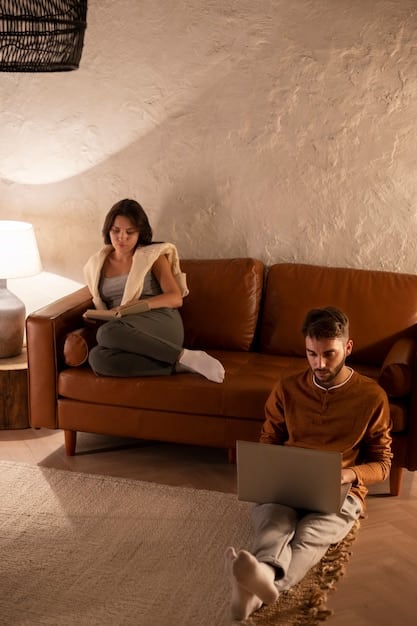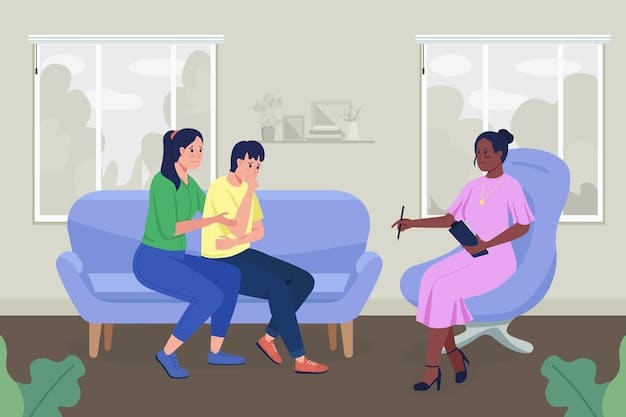Online vs. In-Person Couples Therapy: 2025 Comparison

For 2025, online couples therapy offers unparalleled accessibility and convenience, making it a highly effective alternative to traditional in-person sessions, which still provide unique benefits through physical presence and non-verbal cues.
In an increasingly digital world, the landscape of mental health support is evolving rapidly. Couples seeking to strengthen their relationships now face a crucial decision: should they opt for traditional in-person therapy or embrace the convenience of online sessions? Understanding What Are the Benefits of Online Couples Therapy vs. In-Person Sessions? A Comprehensive Comparison for 2025 is essential, as the nuances between these approaches can profoundly impact the therapeutic journey and ultimate success for couples in the United States.
Understanding the Evolution of Couples Therapy
The practice of couples therapy has undergone significant transformations, adapting to societal changes and technological advancements. Historically, therapy was exclusively conducted in a physical office setting, providing a dedicated space for confidential conversations. However, the advent of the internet and growing acceptance of telehealth services have broadened the horizons, introducing online modalities that challenge traditional norms.
This evolution is not merely about convenience; it reflects a broader shift in how individuals and couples seek and receive support. As we move into 2025, the proliferation of secure, high-quality video conferencing platforms has made online therapy a viable, and often preferable, option for many. It’s important to recognize that both modalities share the core therapeutic objectives: to improve communication, resolve conflicts, foster intimacy, and build stronger, healthier relationships.
Historical Context and Modern Adaptation
Traditional therapy, rooted in early psychological practices, emphasized the importance of a therapist’s physical presence and the nuanced non-verbal cues exchanged in a face-to-face setting. This model, while effective, often presented logistical barriers for many couples, including geographical distance, scheduling conflicts, and the stigma associated with visiting a therapist’s office. The modern adaptation embraces accessibility without compromising the quality of care, aiming to remove these barriers.
- Early beginnings: Therapy was strictly in-person, valuing direct interaction.
- Technological shifts: The internet introduced new possibilities for remote connection.
- Pandemic acceleration: COVID-19 significantly boosted the adoption of online therapy.
- Current landscape: Both options are now widely accepted and accessible in 2025.
The transition from a purely in-person model to one that integrates robust online alternatives signals a maturation of the mental health field. This adaptation prioritizes the specific needs and circumstances of diverse couples, ensuring that support is not limited by physical or temporal constraints. The understanding of this historical progression helps solidify why both approaches hold merit in today’s therapeutic environment.
Key Benefits of Online Couples Therapy
Online couples therapy has emerged as a powerhouse of convenience and accessibility, reshaping how couples engage with professional support. Its benefits extend far beyond simply eliminating the commute, offering significant advantages that cater to modern lifestyles and diverse needs. This modality leverages technology to bring therapeutic expertise directly into the comfort and privacy of a couple’s chosen environment.
One of the most compelling aspects of online therapy is its unparalleled flexibility. Scheduling sessions becomes remarkably simpler when there’s no need to factor in travel time or location. This adaptability is particularly valuable for couples with demanding work schedules, childcare responsibilities, or those living in different locations. The ability to connect from anywhere with an internet connection also opens doors for individuals in rural or underserved areas where specialized couples therapists might be scarce.
Enhanced Accessibility and Convenience
The geographical barriers that once limited access to expert couples therapists are virtually non-existent with online therapy. Couples no longer have to reside within driving distance of a specific practitioner to benefit from their specialized skills. This broadens the selection pool immensely, allowing couples to find the best fit for their unique needs, rather than settling for the closest available option.
- No commute: Eliminates travel time and costs, reducing stress.
- Flexible scheduling: Easier to fit sessions around work, family, and other commitments.
- Geographic reach: Access to therapists specialized in specific issues, regardless of location.
- Reduced stigma: Therapy from home can feel more private and less intimidating.
Moreover, the cost savings associated with online therapy can be substantial. Beyond saving on gas or public transport, some online platforms may offer more competitive pricing models, and the elimination of expenses like parking or childcare can make therapy a more feasible long-term investment for many. The ease of access, combined with potential financial benefits, positions online therapy as a highly attractive solution for many couples in 2025.

Distinct Advantages of In-Person Couples Therapy
While online therapy offers undeniable convenience, the traditional in-person format maintains its own unique and significant advantages. The physical presence in a dedicated therapeutic space fosters an environment distinct from a digital interaction, often enhancing the depth and nuance of the therapeutic process. For some, the traditional setting provides a level of comfort, focus, and connection that is difficult to replicate remotely.
One primary benefit lies in the non-verbal cues. In an in-person setting, a therapist can observe the subtle body language, shared glances, and physical gestures between partners, which often convey as much, if not more, than spoken words. These non-verbal interactions provide invaluable insights into the couple’s dynamic, emotional states, and unspoken tensions, allowing the therapist to intervene more precisely and empathetically.
The Value of Physical Presence and Environment
The controlled, dedicated environment of a therapist’s office is another crucial aspect. This space is intentionally designed to be free from the distractions of home or work, signaling a clear boundary between everyday life and the therapeutic hour. This deliberate separation can help couples shift their mindset, allowing them to fully immerse themselves in the session without interruptions from children, pets, or household tasks.
- Rich non-verbal communication: Direct observation of body language, facial expressions, and interaction.
- Dedicated, distraction-free space: A neutral environment promotes focus and confidentiality.
- Enhanced therapeutic rapport: Some individuals find it easier to build trust and connection face-to-face.
- Crisis intervention capability: Immediate physical presence can be crucial in highly escalated situations.
For couples dealing with severe conflict or highly sensitive issues, the structure and containment offered by an in-person session can be particularly beneficial. The physical presence of a therapist can provide a sense of stability and safety, helping to de-escalate tensions and facilitate difficult conversations more effectively. This creates a more controlled and potentially impactful therapeutic experience, especially when intense emotions are involved.
Technological Considerations and Platform Reliability
The cornerstone of effective online couples therapy is reliable technology and robust platform security. As we progress into 2025, the quality of digital therapeutic interfaces has vastly improved, yet potential users must still be mindful of the technical requirements and inherent limitations. A seamless online experience is crucial for maintaining the flow of therapy and ensuring confidentiality.
For online sessions, stable internet connectivity is paramount. Dropped calls, pixelated images, or audio delays can disrupt the therapeutic process, leading to frustration and hindering effective communication. Both the therapist and the couple must have access to high-speed internet and reliable devices capable of supporting video conferencing. Beyond technical requirements, the security of the platform used for online therapy is non-negotiable. Protecting sensitive personal and relationship information is a top priority, necessitating the use of HIPAA-compliant platforms.
Ensuring Privacy and Connectivity
Privacy concerns in online therapy extend beyond just HIPAA compliance. Couples must also establish a private space within their own homes where they can speak freely without fear of being overheard. While convenient, the home environment can pose challenges related to privacy, especially for those living in shared spaces or with children.
- Internet stability: A strong, consistent connection is essential for uninterrupted sessions.
- Device compatibility: Ensuring appropriate gadgets (computers, tablets) with working cameras and microphones.
- Platform security: Use of HIPAA-compliant, encrypted video conferencing tools.
- Home privacy: Creating a confidential space free from interruptions.
Moreover, the reliability of the chosen therapy platform itself plays a critical role. Leading online therapy providers invest heavily in user-friendly interfaces, secure data handling, and technical support. This focus on technological excellence ensures that the platform itself does not become a barrier to therapy, allowing couples to focus on their emotional work rather than troubleshooting technical glitches. Opting for reputable services is key to maximizing the benefits of online therapy while minimizing potential frustrations.
Suitability for Different Couples and Situations
The choice between online and in-person couples therapy is highly individual, with each modality offering unique advantages depending on a couple’s specific circumstances, challenges, and preferences. What works exceptionally well for one couple might not be the ideal solution for another. Therefore, a careful assessment of a couple’s needs, their relationship dynamic, and practical considerations is essential in making an informed decision for 2025.
Online therapy is often a perfect fit for couples dealing with logistical hurdles. This includes partners in long-distance relationships, military families, or those where one or both individuals travel frequently for work. Its convenience also appeals to parents of young children who might struggle to secure childcare for in-person appointments. Additionally, individuals who feel more comfortable discussing sensitive topics from the familiarity of their own home might thrive in an online setting, seeing it as less intimidating.
Who Best Benefits from Which Modality?
Conversely, in-person therapy can be more advantageous for couples facing severe relationship distress, high-conflict situations, or those dealing with complex issues such as infidelity, addiction, or domestic violence. The therapist’s immediate physical presence can be crucial in managing intense emotions, de-escalating arguments, and providing a sense of containment and safety during highly charged sessions.
- Online suitability: Long-distance couples, busy professionals, individuals with mobility issues, those prioritizing convenience.
- In-person suitability: High-conflict couples, severe distress, preference for direct interaction, issues requiring immediate intervention.
- Technological comfort: Online therapy requires a degree of comfort with digital platforms.
- Privacy needs: Ability to secure a private, distraction-free space for online sessions.
Furthermore, some couples may simply prefer the traditional experience, finding that direct eye contact and shared physical space enhance their connection with the therapist and each other. The decision often boils down to a blend of practical factors and personal comfort levels. A therapist can often help guide couples in determining the most suitable modality based on their initial assessment and therapeutic goals for 2025.
Therapist Perspectives and Ethical Considerations
The shift towards online therapy has prompted therapists to adapt their practices, embracing new technologies while upholding the rigorous ethical standards of their profession. From a therapist’s perspective, both online and in-person sessions demand a commitment to confidentiality, professional boundaries, and effective therapeutic interventions. The ethical considerations, however, can sometimes differ between the two modalities, requiring careful navigation.
One primary concern for therapists practicing online is ensuring the security and privacy of client data. This involves using encrypted platforms and adhering to strict data protection regulations, such as HIPAA in the United States. Therapists must also consider the potential for technological disruptions during sessions and have contingency plans in place to ensure continuity of care. Additionally, assessing the client’s home environment for sufficient privacy is another important ethical consideration, as it directly impacts the confidentiality of the session.
Navigating Professional Boundaries and Care Quality
Maintaining professional boundaries in an online setting can also present unique challenges. While the physical separation might seem to reinforce boundaries, therapists must be vigilant about the nuances of communicating through a screen, ensuring that the therapeutic relationship remains professional and focused. This includes being clear about emergency protocols and what constitutes an appropriate response in a crisis when physical presence is not an option.
- Data security: Mandate use of HIPAA-compliant, encrypted platforms.
- Emergency protocols: Clear plans for crisis intervention in a remote setting.
- Licensure across states: Therapists must typically be licensed in the state where the client is located.
- Non-verbal interpretation: Adapting to interpret cues through a screen.
Moreover, the issue of therapist licensure across state lines is critical in online therapy. A therapist must typically be licensed in the state where the client resides, which can limit the geographic reach for some practitioners. As of 2025, regulatory bodies are continually working to streamline these complexities to better support both therapists and clients. Ultimately, therapists are committed to delivering high-quality, ethical care, regardless of the delivery method, adapting their skills to meet the unique demands of each modality.
Making the Best Choice for Your Relationship in 2025
Choosing between online and in-person couples therapy is a significant decision that should be approached thoughtfully, considering the unique needs and dynamics of your relationship. There is no one-size-fits-all answer, and what constitutes the “best” choice is deeply personal. For 2025, making an informed decision involves weighing practical considerations, therapeutic goals, and individual preferences to ensure the most effective and supportive path for your journey.
Start by honestly assessing your comfort level with technology and your ability to create a private, distraction-free environment for online sessions. If technical issues are a source of stress, or if your home environment doesn’t provide adequate privacy, in-person therapy might be less stressful. Conversely, if flexibility, accessibility, and comfort in your own space are top priorities, online therapy shines. Consider also the severity and nature of the issues you wish to address. For some profound or high-conflict situations, the immediate, tangible presence of a therapist in person can be invaluable.
Step-by-Step Decision-Making Process
Engage in an open conversation with your partner about preferences and concerns regarding both modalities. This discussion itself can be a valuable exercise in communication and compromise, setting a positive tone for your therapeutic journey. Research therapists who offer both options, or specialize in one, and consider scheduling initial consultations to get a feel for their approach and how they conduct sessions in each format.
- Assess practical needs: Consider schedules, travel, and childcare.
- Evaluate comfort with technology: Your digital fluency matters for online sessions.
- Discuss privacy at home: Ensure a confidential space for remote therapy.
- Consider relationship dynamics: High-conflict issues might benefit from in-person support.
- Consult with therapists: Many offer initial consultations to discuss options.

Remember that the ultimate goal is effective therapy that helps you and your partner achieve your relationship goals. Don’t be afraid to try one modality and switch if it’s not meeting your needs. The flexibility to adapt and find what truly works is a significant advantage in the evolving landscape of couples therapy in 2025. Your journey towards a healthier relationship is personal, and the therapeutic method should align directly with that individuality.
| Key Aspect | Brief Description |
|---|---|
| 🔄 Flexibility | Online offers unmatched scheduling and location freedom. |
| 🛋️ Comfort & Privacy | Online: Home setting. In-person: Dedicated therapeutic space. |
| 🗣️ Communication Nuance | In-person excels with non-verbal cues; online may have limitations. |
| 🛡️ Safety & Crisis | In-person offers immediate presence for high-intensity situations. |
Frequently Asked Questions
▼
While often effective, online therapy may be less suitable for high-conflict issues or severe crises where immediate physical presence is beneficial. Its efficacy largely depends on the couple’s specific needs, comfort with technology, and the nature of their challenges. For many common relationship issues, it proves equally beneficial.
▼
You’ll need a stable internet connection, a reliable device (computer, tablet, or smartphone) with a working camera and microphone, and a quiet, private space. Therapists typically use secure, HIPAA-compliant video conferencing platforms to ensure your privacy and provide a smooth session experience.
▼
Reputable online therapists use encrypted platforms specifically designed for telehealth, adhering to strict privacy regulations like HIPAA. They also advise clients to conduct sessions from a private location to prevent unauthorized listening. This combined approach protects sensitive personal and relationship information effectively.
▼
For severe conflicts, in-person therapy often allows for better observation of non-verbal cues and provides a more contained environment. However, some online therapists are highly skilled in managing complex cases remotely. It’s crucial to discuss the severity of your issues with a therapist to determine the most appropriate modality.
▼
Costs can vary widely based on the therapist’s experience, location, and whether they accept insurance. Online therapy may reduce ancillary costs like travel and childcare, potentially making it more accessible financially. Some online platforms also offer tiered pricing or subscription models that might differ from traditional rates.
Conclusion and Outlook for Couples Therapy in 2025
For couples navigating the complexities of modern relationships, the choice between online and in-person therapy in 2025 is not about one being inherently superior, but rather about identifying the best fit for their unique circumstances and therapeutic goals. Both modalities have evolved to offer high-quality support, each with distinct advantages that cater to different needs. Online therapy excels in terms of accessibility, convenience, and flexibility, making it an ideal choice for busy schedules, long-distance relationships, and those seeking therapy from the comfort of their home. Conversely, in-person sessions provide the invaluable benefit of physical presence, enhanced non-verbal observation, and a dedicated, distraction-free environment, which can be particularly beneficial for severe conflicts or those who prefer direct human interaction. The future of couples therapy is likely to be a hybrid one, offering both options to maximize choice and effectiveness, ensuring that professional support remains accessible to all who seek to strengthen their bonds.





